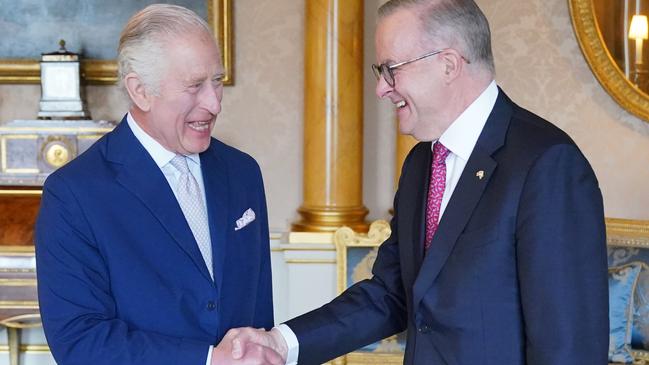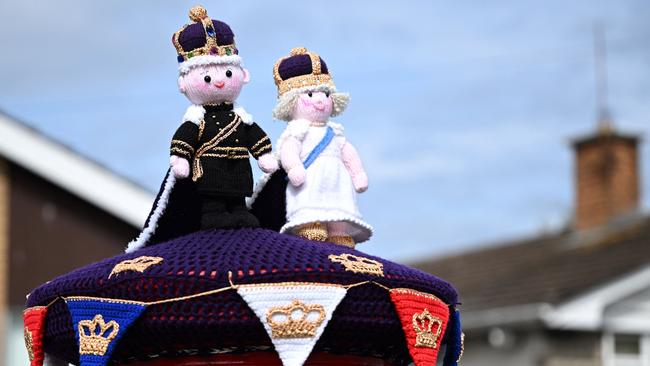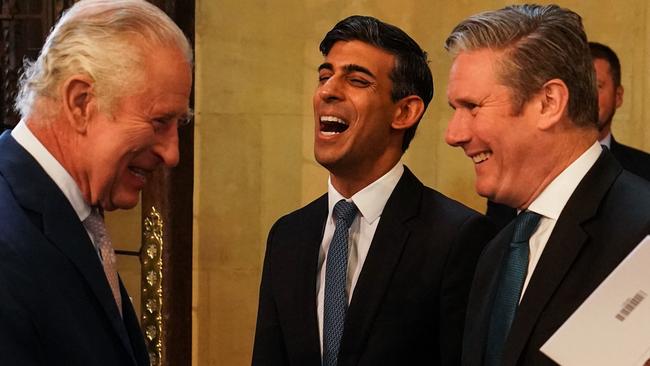Prime Minister Anthony Albanese’s controversial King Charles coronation decision
The republican prime minister has made a massive call when it comes to the coronation – and it will anger some of his supporters.
Royals
Don't miss out on the headlines from Royals. Followed categories will be added to My News.
Prime Minister Anthony Albanese has confirmed he will take an oath of allegiance to King Charles III at this weekend’s coronation – despite being a long time republican.
Mr Albanese is in London for the coronation which takes place on Saturday evening, Australia time.
On Tuesday, the PM met Charles at Buckingham Palace, remarking it was an “honour to represent Australia”.
Part of the ceremony will include the “homage of the people” where everyone in Westminster Abbey and watching elsewhere will be able to pledge allegiance to the new king.
At a point during the coronation people will be invited to say: “God save King Charles. Long live King Charles. May the King live forever”.
The oath isn’t mandatory but Mr Albanese told broadcaster Piers Morgan he would be taking part.

On Tuesday evening, UK time, the Prime Minister will appear on Piers Morgan Uncensored which is produced by Britain’s TalkTV and broadcast on Sky News in Australia.
Morgan tweeted that “die hard Republican” Mr Albanese “says he WILL swear the oath of allegiance to King Charles III in Westminster Abbey”.
The PM had dodged the same question posed by Australian media in London on Monday.
BREAKING: Australia’s Prime Minister Anthony Albanese, a die-hard republican, says he WILL swear the oath of allegiance to King Charles III in Westminster Abbey. He makes the revelation in my exclusive interview for â¦@PiersUncensoredâ© which airs on â¦@TalkTVâ© at 8pm. pic.twitter.com/lvvBsyy8Pq
— Piers Morgan (@piersmorgan) May 2, 2023
Co-chair of the Australian Republic Movement ex footballer Craig Foster had urged the PM to snub the oath.
“We shouldn’t be expected to grovel before a King, or pledge obedience and neither should our members of parliament.
“A head of state should pledge their loyalty us, not the other way round. We need an anti-pledge,” he said.
But while Mr Albanese’s antimonarchy views are well known, as the prime minister of a country which is a Commonwealth realm it would have been awkward for him to not swear allegiance to Australia’s head of state.
Indeed, all Australian MPs are required to affirm their allegiance to the monarch of Australia before they take their seats.

Currently 15 of the 56 Commonwealth nations share a head of state in Charles III. Known as the Commonwealth realms these independent nations include the UK, Australia, Canada, New Zealand, Jamaica, the Bahamas and Belize.
Since becoming Prime Minister, Mr Albanese has been diplomatic when it comes to his republican stance only saying the issue was “important”.
He hasn’t directly criticised the monarchy but has flagged the possibility of a referendum on a republic – albeit not before a possible second term in office and after The Voice vote.
“To me, it is inconceivable that the next change that we need for our constitution is anything other than recognising that our national birth certificate, which is what the Constitution represents, should acknowledge that history didn’t begin in 1788,” he said last September.

However, Mr Albanese has appointed an assistant minister for the republic in Matt Thistlethwaite.
“We have a proxy representative in the Governor-General. But we can have an Australian as our head of state,” Mr Thistlethwaite said last year.
Nonetheless, the government is wary of staging another referendum unless there is a good chance of Australians voting to ditch their royal ties.
Last month the new Australian ambassador to the UK said it was “inevitable” Australia would become a republic but he didn’t set out a timeline.
“There is a lot of affection and respect for the monarchy in Australia,” former foreign affairs Minister Stephen Smith, who has recently taken up the plum London post, told The Times.
“That affection and respect hasn’t gone away because of Australia contemplating from time to time what it should do about its constitutional arrangements.
“My personal view is it’s inevitable. But how that’s progressed is entirely a matter for the Australian government of the day.
“Whether down the track there is a future referendum associated with Australia and the UK’s constitutional arrangements, only time will tell.”
Originally published as Prime Minister Anthony Albanese’s controversial King Charles coronation decision





